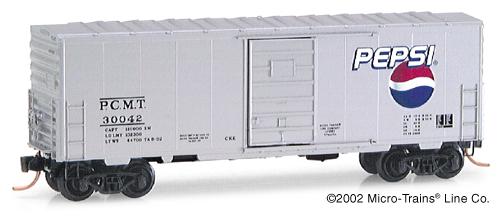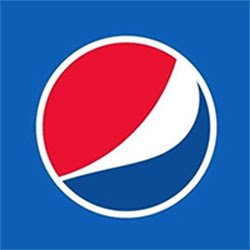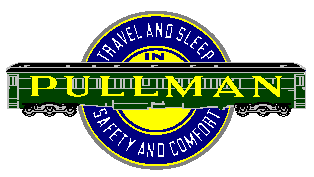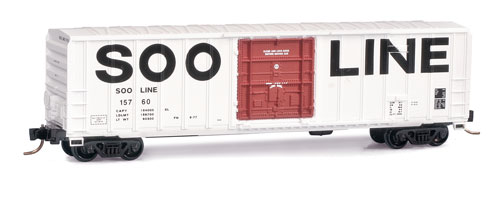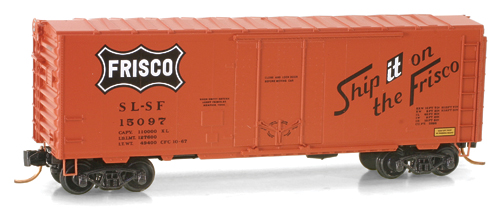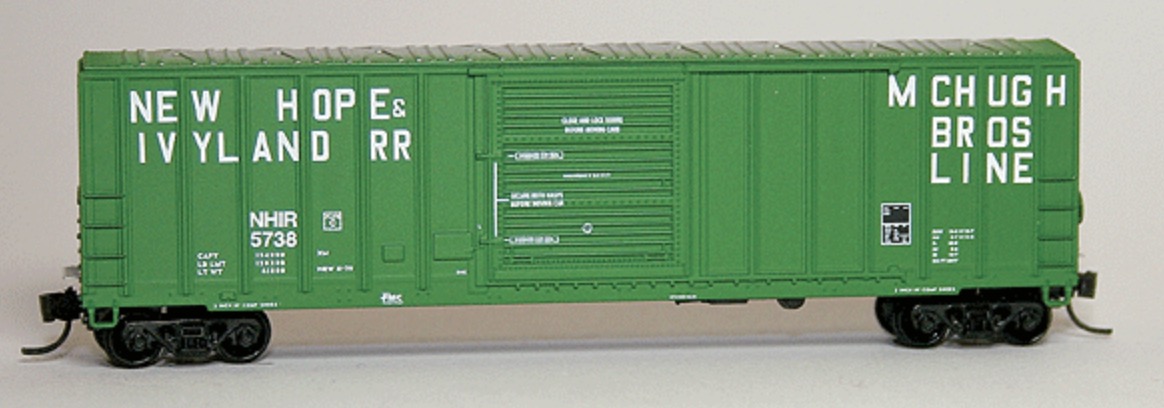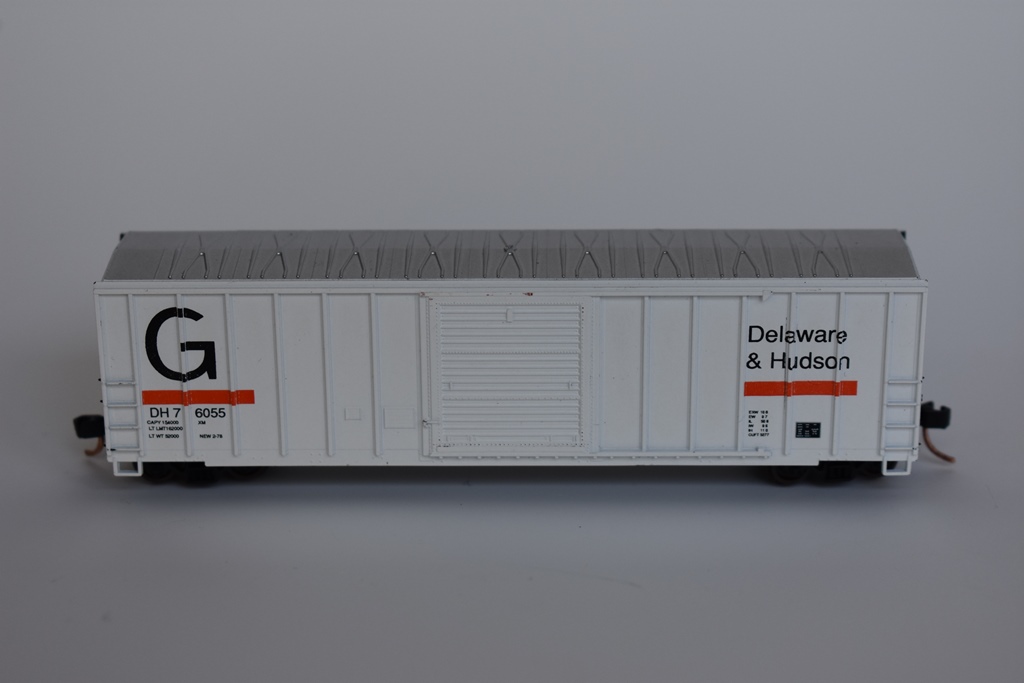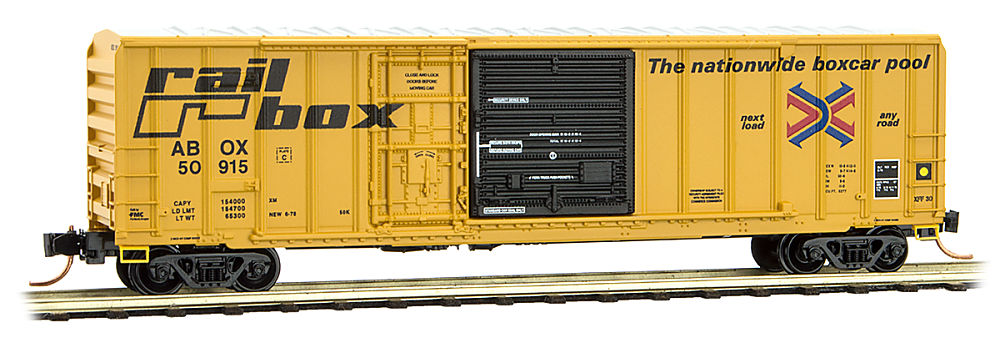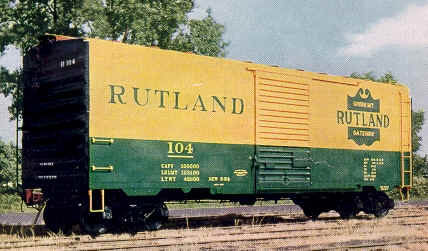Micro-Trains - 24300 - Boxcar, 40 Foot, PS-1 - Pepsi - 30042
Click to see the details
market
Click to see the details
history
Click to see the details
collector
| Stock Number | 24300 |
| Secondary Stock Number | 024 00 300 |
| Original Retail Price | $18.95 |
| Brand | Micro-Trains |
| Manufacturer | Micro-Trains Line |
| Body Style | Micro-Trains 024 Boxcar 40 Foot Sliding Door No Roofwalk |
| Prototype Vehicle | Boxcar, 40 Foot, PS-1 (Details) |
| Road or Company Name | Pepsi (Details) |
| Reporting Marks | PCMT |
| Road or Reporting Number | 30042 |
| Paint Color(s) | Aluminum |
| Print Color(s) | Black |
| Coupler Type | MT Magne-Matic Knuckle |
| Coupler Mount | Truck-Mount |
| Wheel Type | Injection Molded Plastic |
| Wheel Profile | Standard |
| Release Date | 2002-09-01 |
| Item Category | Rolling Stock (Freight) |
| Model Type | Boxcar |
| Model Subtype | 40 Foot |
| Model Variety | Steel, No Roofwalk |
| Prototype Region | North America |
| Prototype Era | NA Era III: Transition (1939 - 1957) |
| Scale | 1/160 |
Model Information:
This is a model of a PS-1 boxcar with no roofwalk. Micro-Trains introduced this version of their popular steel boxcar in 1976. It features the same operating doors as the popular 20000 series boxcar with similar dimensions and details but this model is appropriate for hobbyists who model the post-roofwalk era.
Prototype History:
The 40' Boxcar is widely known as one of the most popular freight cars used by railroads as they transitioned from steam to diesel. In particular the Pullman Standard or PS-1 design was one of the most popular and was widely used by North American railroads. These boxcars were built beginning in 1947 and share the same basic design, with certain elements such as door size, door style or roof type varying among the different railroads and production years. When production of these cars ceased in 1963, over 100,000 had been produced.
So just what is a PS-1? Well the simple answer is it is any boxcar built by Pullman Standard from 1947 on. The design changed over the years – sometimes subtly, sometimes for customer request, and sometimes in a larger way. In general, most PS-1’s built from 1947 to 1961 share the same dimensions and basic construction techniques. These cars all had a length of 40′, a height of 10’5″ or 10’6″, welded sides and ends and roof of Pullman’s own design. The greatest variation was in the size and style of doors used. Pullman Standard also offered 50′ and later 60′ boxcars – also with the PS-1 designation.
So just what is a PS-1? Well the simple answer is it is any boxcar built by Pullman Standard from 1947 on. The design changed over the years – sometimes subtly, sometimes for customer request, and sometimes in a larger way. In general, most PS-1’s built from 1947 to 1961 share the same dimensions and basic construction techniques. These cars all had a length of 40′, a height of 10’5″ or 10’6″, welded sides and ends and roof of Pullman’s own design. The greatest variation was in the size and style of doors used. Pullman Standard also offered 50′ and later 60′ boxcars – also with the PS-1 designation.
Road Name History:
PepsiCo, Inc. is an American multinational food, snack and beverage corporation headquartered in Purchase, New York, United States, with interests in the manufacturing, marketing, and distribution of grain-based snack foods, beverages, and other products. PepsiCo was formed in 1965 with the merger of the Pepsi-Cola Company and Frito-Lay, Inc. PepsiCo has since expanded from its namesake product Pepsi to a broader range of food and beverage brands, the largest of which includes an acquisition of Tropicana in 1998 and of Quaker Oats in 2001, which added the Gatorade brand to its portfolio.
As of January 26, 2012, 22 of PepsiCo's brands generated retail sales of more than $1 billion apiece,[2] and the company's products were distributed across more than 200 countries, resulting in annual net revenues of $43.3 billion. Based on net revenue, PepsiCo is the second largest food and beverage business in the world. Within North America, PepsiCo is the largest food and beverage business by net revenue.
Indra Krishnamurthy Nooyi has been the chief executive of PepsiCo since 2006. The company's beverage distribution and bottling is conducted by PepsiCo as well as by licensed bottlers in certain regions. Approximately 274,000 employees generated $66.415 billion in revenue as of 2013.
From Wikipedia
As of January 26, 2012, 22 of PepsiCo's brands generated retail sales of more than $1 billion apiece,[2] and the company's products were distributed across more than 200 countries, resulting in annual net revenues of $43.3 billion. Based on net revenue, PepsiCo is the second largest food and beverage business in the world. Within North America, PepsiCo is the largest food and beverage business by net revenue.
Indra Krishnamurthy Nooyi has been the chief executive of PepsiCo since 2006. The company's beverage distribution and bottling is conducted by PepsiCo as well as by licensed bottlers in certain regions. Approximately 274,000 employees generated $66.415 billion in revenue as of 2013.
From Wikipedia
Brand/Importer Information:
Micro-Trains is the brand name used by both Kadee Quality Products and Micro-Trains Line. For a history of the relationship between the brand and the two companies, please consult our Micro-Trains Collector's Guide.
Manufacturer Information:
 Micro-Trains Line split off from Kadee Quality Products in 1990. Kadee Quality Products originally got involved in N-Scale by producing a scaled-down version of their successful HO Magne-Matic knuckle coupler system. This coupler was superior to the ubiquitous 'Rapido' style coupler due to two primary factors: superior realistic appearance and the ability to automatically uncouple when stopped over a magnet embedded in a section of track. The success of these couplers in N-Scale quickly translated to the production of trucks, wheels and in 1972 a release of ready-to-run box cars.
Micro-Trains Line split off from Kadee Quality Products in 1990. Kadee Quality Products originally got involved in N-Scale by producing a scaled-down version of their successful HO Magne-Matic knuckle coupler system. This coupler was superior to the ubiquitous 'Rapido' style coupler due to two primary factors: superior realistic appearance and the ability to automatically uncouple when stopped over a magnet embedded in a section of track. The success of these couplers in N-Scale quickly translated to the production of trucks, wheels and in 1972 a release of ready-to-run box cars.
Micro-Trains Line Co. split off from Kadee in 1990 to form a completely independent company. For this reason, products from this company can appear with labels from both enterprises. Due to the nature of production idiosyncrasies and various random factors, the rolling stock from Micro-Trains can have all sorts of interesting variations in both their packaging as well as the products themselves. When acquiring an MTL product it is very important to understand these important production variations that can greatly enhance (or decrease) the value of your purchase.
Please consult our Micro-Trains Collector's Guide

Micro-Trains Line Co. split off from Kadee in 1990 to form a completely independent company. For this reason, products from this company can appear with labels from both enterprises. Due to the nature of production idiosyncrasies and various random factors, the rolling stock from Micro-Trains can have all sorts of interesting variations in both their packaging as well as the products themselves. When acquiring an MTL product it is very important to understand these important production variations that can greatly enhance (or decrease) the value of your purchase.
Please consult our Micro-Trains Collector's Guide
Item created by: Lethe
on 2015-05-31 17:46:30
Last edited by: George on 2024-01-26 20:28:45
If you see errors or missing data in this entry, please feel free to log in and edit it. Anyone with a Gmail account can log in instantly.
Last edited by: George on 2024-01-26 20:28:45
If you see errors or missing data in this entry, please feel free to log in and edit it. Anyone with a Gmail account can log in instantly.


